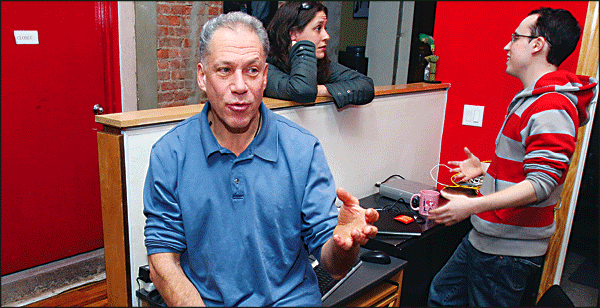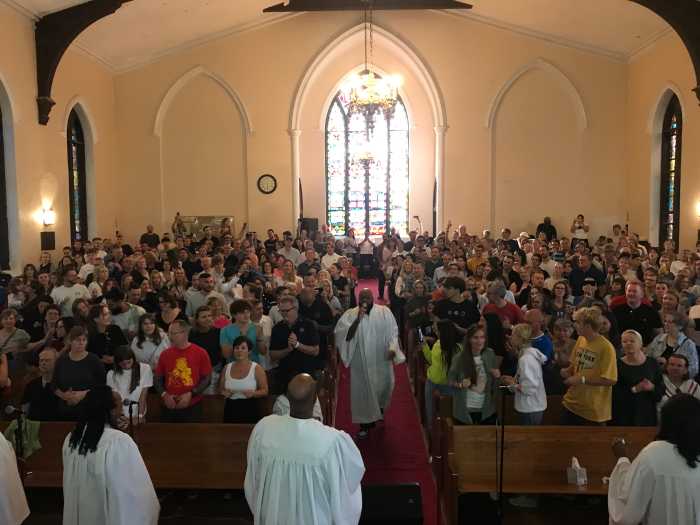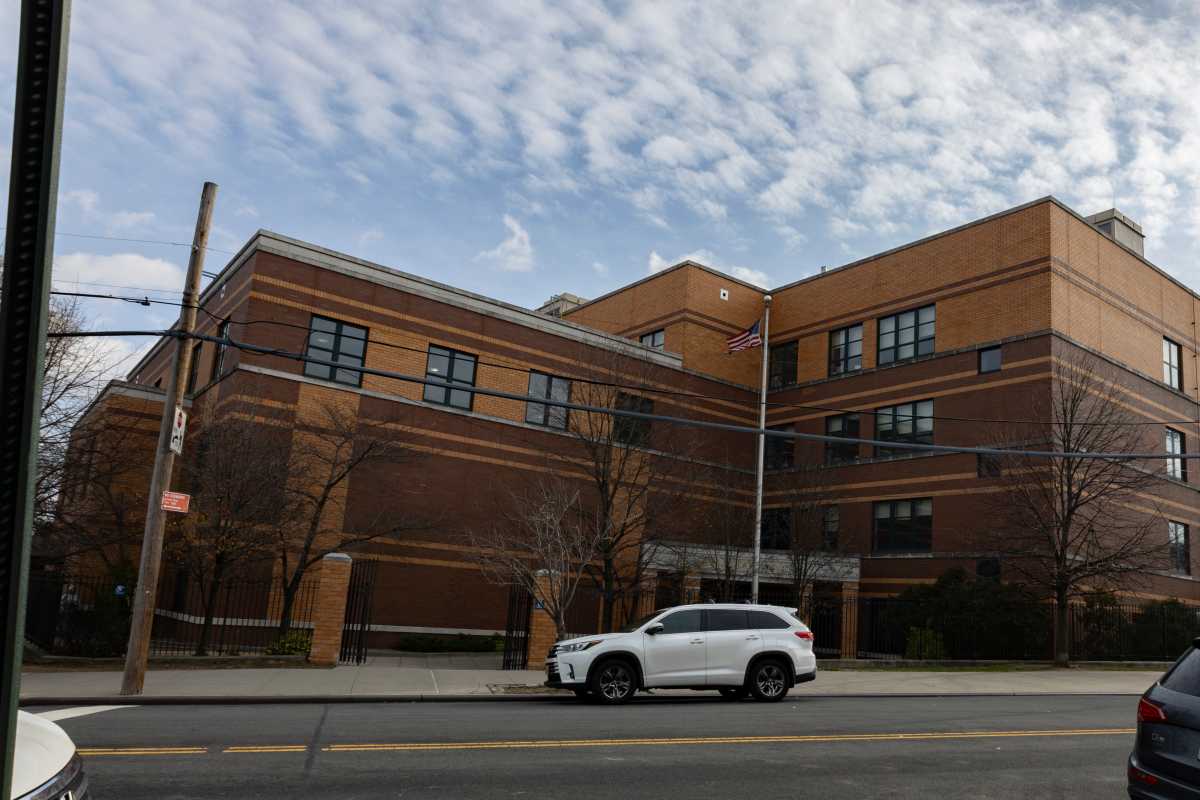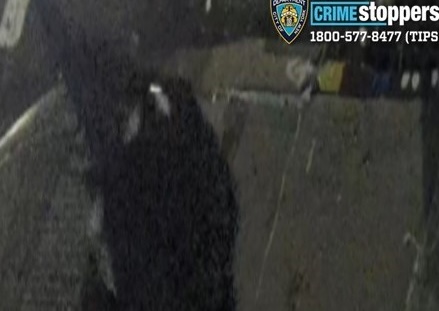By Julie Shapiro
The camera pans over the protestors, holding signs in Spanish and English, marching to pounding drums beneath banners in red, white and blue, screaming: “Si se puede!”
As the parade surges past, several men and women break apart from the crowd to tell the camera why they are marching: to give illegal immigrants the right to earn a living in America and become citizens.
This is one scene from the short documentary, “Si Se Puede (Yes We Can)” filmed by three high school students. In May, the students will see their film on the big screen as part of Our City, My Story, a youth media competition sponsored by the Tribeca Film Institute during the Tribeca Film Festival.
Iemi Hernandez-Kim, Roanda Vatel and Rosalino Ramos, high school seniors, made “Si Se Puede” through a program called PRO-TV at the Downtown Community Television Center. DCTV, an independent nonprofit studio, runs a two-year mentoring program for high school filmmakers.
While many high schoolers spend their Sunday afternoons watching movies, the PRO-TV students spend their Sunday afternoons making them. They come to DCTV’s studio in the Civic Center twice a week to plan, film and edit, producing short documentaries that receive wide acclaim.
The Tribeca Film Institute received more than 100 youth film submissions and selected 11 to screen. In addition to “Si Se Puede,” the festival will feature “Crazy Little Dancer,” an autobiographical film by PRO-TV student Lilibeth Chauca. “Si Se Puede” also recently won recognition from the National Foundation for Advancement in the Arts.
PRO-TV accepts eight to 12 students a year for its intensive program, out of nearly 50 who apply. DCTV pays the students minimum wage for the hours they spend in the studio, partly to train them for the real world and partly because many of them need to contribute to their family economy.
The students started filming “Si Se Puede” in the fall of 2006, when a bill before Congress would have made it harder for immigrants to come to the United States to work and would have increased penalties for illegal immigrants. The students interviewed activists on both sides and filmed the fiery May Day protest in Lower Manhattan last spring.
Hernandez-Kim, 17, sided with the immigrants before making the film, partly because she is an immigrant herself. She was born in Mexico and her family legally came to the United States when she was a baby. But as she made the film, she began to question her position, especially after interviewing anti-immigration activists who argued that illegal immigrants wreak havoc on the economy and job market.
“There are good and bad sides of making a documentary film,” Hernandez-Kim said recently, while editing another one of her films. “You can actually say something to people, have a voice, as corny as that sounds. But a lot of your morals are tested.”
The students interviewed one man who bounced around several South and Central American countries before crossing illegally from Mexico into the United States. The camera focuses on a large map while he uses a finger to trace his journey. Dim lighting keeps his face hidden in shadow as he narrates his struggles in Spanish.
“We’re all affected by immigration,” said Vatel, 16, whose parents were born in Haiti. While making “Si Se Puede,” she researched immigration laws and advocated for including non-Hispanic immigrants in the film.
Vatel, who attends the Urban Assembly School for Law and Justice in Brooklyn, was planning to be a lawyer until she started making films. Her parents were not pleased with her change in ambition, and their disapproval became the subject of Vatel’s second documentary. After her parents saw themselves shouting at their daughter on tape, “They listened up a bit,” Vatel said. “They didn’t realize how much they are pushing me.”
Vatel wrote her personal essay for her college applications about PRO-TV, and Trinity College, in Connecticut, replied with a personalized acceptance letter saying that her filmmaking impressed them. Vatel also got into her first choice, Amherst College, and is weighing financial aid packages to make her decision. She hopes to continue filming in college and wants her next project to be a scripted movie.
For Orlando Richards, PRO-TV instructor, the class is about more than just learning the mechanics of filmmaking — though students learn to operate professional-grade cameras and editing software. But, more important, Richards wants the students to make films that matter to them and teach them to see their environment in a new way.
Richards brought the students, many of them Hispanic, to the immigration protests so they could see a national issue playing out in the local community.
“It dawned on them: This is me, this is part of my life,” Richards said. “They get more involved and start to see themselves as part of the bigger picture.”
Shooting documentaries helps the students grow up faster than they would, Richards said. “When you take a camera, you have to take responsibility for what you’re doing,” he said.
Every year, PRO-TV sends several students abroad through barter programs. In exchange for free travel, the students create documentaries for the sponsoring organizations when they return to New York. Hernandez-Kim, a student at Edward Morrow High School in Brooklyn, spent last summer backpacking through China — her first time backpacking through anywhere. She returned home with countless new experiences and 50 hours of footage that she is parsing into a documentary.
“Everything is different,” she said of China. “It’s more hostile. People on the buses push you and yell at you.”
On a recent afternoon, Hernandez-Kim sat at a computer at DCTV editing clips of an orphanage she visited. Her head resting on her hands, she clicked through the clips. Hernandez-Kim, who lives in Brooklyn, said the trip actually taught her the most about Americans. The other teenagers on her trip were from the suburbs. “There’s a big difference,” she said.
Jon Alpert, co-founder and co-director of DCTV, created the travel program to give broader exposure to the students, some of whom have never left New York City. Suddenly, when the students find themselves in Guatemala, India or Sibera — places that “might as well have been Mars or Venus,” Alpert said — they have to adapt quickly, filming all the while.
“Maturation [goes] to warp speed,” Alpert said. “It’s like waving a magic wand over these kids…. They’re seeing the world with a camera as their passport.”
Lilibeth Chauca, 18, didn’t have to go anywhere for her camera to teach her to see a different side of herself. She filmed her autobiography, “Crazy Little Dancer,” almost entirely at her home in Queens.
“I knew dance was important to me, but from the video I realized how important it was, how it opened me up,” Chauca said.
In the film, Chauca describes growing up surrounded by sisters who were more outgoing and social. She would listen to their problems and stories, but rarely shared her own thoughts. Her oldest sister had parties in their backyard, but Chauca stayed inside.
Chauca said she found an outlet in salsa dance, which enabled her to express herself in a different way and gain confidence. When Chauca speaks to the camera in her film, her words are careful and measured. But in scenes of her salsa dance class, her movements are strong and sure. She collapses to the ground, laughing, as she and her partner struggle to learn a new move — and when they master the skill several scenes later, Chauca’s expression is triumphant.
Showing the film to her family helped them understand her, Chauca said. They knew she loved to dance, but they didn’t know why. “I’m not really open about my feelings,” Chauca said. “From the film, they understood why I took classes…how it makes me feel.”
Chauca got interested in filmmaking after taking a class at her high school, Manhattan Center for Science and Mathematics, about how the media shapes social change. She’s working on a documentary about the presidential election that she hopes will encourage people to vote, and she plans to continue taking film classes at Buffalo State College next year.
Chauca was surprised and pleased to hear that “Crazy Little Dancer” was chosen to be screened during the Tribeca Film Festival.
“It took a lot more work than I thought it would take,” Chauca said of making her film. “When you see something like that, you think, ‘I could do that.’ [But] it really was pouring your heart out.”
Alpert started PRO-TV in 1978 after the city slashed school budgets, making art and music classes a thing of the past.
“I didn’t think it was fair for city kids to be deprived,” Alpert said recently from DCTV’s office on Lafayette St.
Thirty years ago, Lower East Side Prep, a public high school, asked him to come in and teach video production, and Alpert found himself working with high schoolers who were “functionally illiterate.” Those students faced nearly insurmountable challenges in their core classes, but they grew up watching TV and had a natural aptitude for filmmaking, Alpert said.
Back then, video equipment was clunky and the kids had to work much harder to learn the technology, Alpert said. Now, the students get their own color digital cameras, which they can take home, and they edit the films with the click of a mouse using Avid and Final Cut Pro software. Next year, Alpert is planning to go high-definition.
DCTV works with New York City schools to offer film workshops to 700 students a year, and a handful of those students enroll in the more intensive PRO-TV program. The youth programs are funded by private corporate foundations and government agencies.
DCTV also produces documentaries for HBO, PBS and the Discovery Channel on everything from the Latin Kings gang to the Arkansas National Guard. The studio offers classes to adult filmmakers and runs a program called ConnecTV that creates films by and about people with disabilities. On a recent afternoon, Alpert, an Emmy-winning journalist, padded around the office in his socks, deep in thought over editing work for a new DCTV documentary.
Alpert sees the students’ video autobiographies — their second major project as part of the PRO-TV program — as key to their development as both a filmmaker and an adult.
“They have obstacles that would just paralyze someone like me,” Alpert said. “They don’t try to hide the difficulties they’re faced with. They stand in front of the camera and say, ‘This is who I am, this is where I come from and this is what I’ve overcome.’”
The autobiographies reveal parents who are in jail or on drugs, families living in extreme poverty and neighborhoods torn by gang violence.
Megan Rosado, 17, found the making of her autobiography, “Broken Mirror,” to be one of the most transformative experiences of her life.
Rosado, a student at Cardinal Spellman High School in the Bronx, used the film to delve into the two biggest obstacles she’s faced: growing up with a twin brother who has severe autism and battling anorexia.
“I got really personal with it,” Rosado said. During some of the interviews in the 15-minute film, she begins to cry. She describes blaming herself for her brother’s inability to connect with people, the pressure her parents put on her to get perfect grades and her descent into self-starvation. As Rosado haltingly voices over a description of how it feels to pass out from hunger, the camera pans over sunlit trees, and the image gradually fades to black-and-white.
The film went through many iterations, as Rosado struggled with how candid she should be. Finally, she decided to make the film completely honest, by pretending that no one would ever see the finished product except for her. Screening the film before her classmates and family members was nerve-wracking, because she was used to hiding her problems from those closest to her.
“I had to face what was going on inside me,” she said of making the film. “When you recover, you’re so happy to recover, you don’t want to go back…. Hopefully this will help somebody.”
Rosado, who has long, dark hair and eyes that are bright behind her glasses, plans to attend a CUNY school next year to study mass communications and business. She hopes to own a production company someday, so she can make the screenplays and stories she’s written into films.
“I’m gonna work so hard,” Rosado said. “I’m praying it will pay off.”
For more information about viewing “Si Se Puede” and “Crazy Little Dancer,” which are not officially part of the film festival, visit the Tribeca Film Institute Web site at TribecaFilmInstitute.org.
Julie@DowntownExpress.com



































